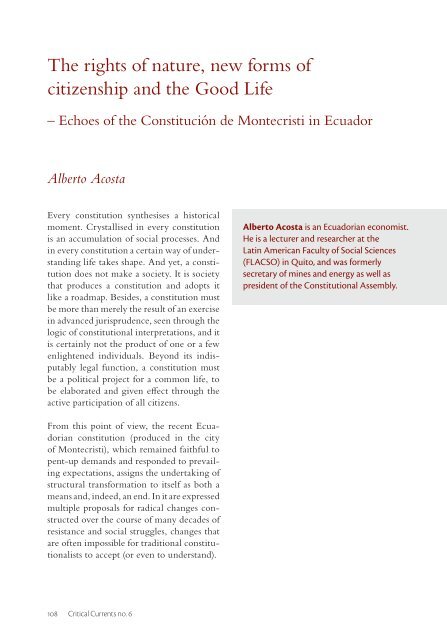Contours of Climate Justice - Dag Hammarskjöld Foundation
Contours of Climate Justice - Dag Hammarskjöld Foundation
Contours of Climate Justice - Dag Hammarskjöld Foundation
You also want an ePaper? Increase the reach of your titles
YUMPU automatically turns print PDFs into web optimized ePapers that Google loves.
The rights <strong>of</strong> nature, new forms <strong>of</strong><br />
citizenship and the Good Life<br />
– Echoes <strong>of</strong> the Constitución de Montecristi in Ecuador<br />
Alberto Acosta<br />
Every constitution synthesises a historical<br />
moment. Crystallised in every constitution<br />
is an accumulation <strong>of</strong> social processes. And<br />
in every constitution a certain way <strong>of</strong> understanding<br />
life takes shape. And yet, a constitution<br />
does not make a society. It is society<br />
that produces a constitution and adopts it<br />
like a roadmap. Besides, a constitution must<br />
be more than merely the result <strong>of</strong> an exercise<br />
in advanced jurisprudence, seen through the<br />
logic <strong>of</strong> constitutional interpretations, and it<br />
is certainly not the product <strong>of</strong> one or a few<br />
enlightened individuals. Beyond its indisputably<br />
legal function, a constitution must<br />
be a political project for a common life, to<br />
be elaborated and given eff ect through the<br />
active participation <strong>of</strong> all citizens.<br />
From this point <strong>of</strong> view, the recent Ecuadorian<br />
constitution (produced in the city<br />
<strong>of</strong> Montecristi), which remained faithful to<br />
pent-up demands and responded to prevailing<br />
expectations, assigns the undertaking <strong>of</strong><br />
structural transformation to itself as both a<br />
means and, indeed, an end. In it are expressed<br />
multiple proposals for radical changes constructed<br />
over the course <strong>of</strong> many decades <strong>of</strong><br />
resistance and social struggles, changes that<br />
are <strong>of</strong>ten impossible for traditional constitutionalists<br />
to accept (or even to understand).<br />
108 Critical Currents no. 6<br />
Alberto Acosta is an Ecuadorian economist.<br />
He is a lecturer and researcher at the<br />
Latin American Faculty <strong>of</strong> Social Sciences<br />
(FLACSO) in Quito, and was formerly<br />
secretary <strong>of</strong> mines and energy as well as<br />
president <strong>of</strong> the Constitutional Assembly.
















